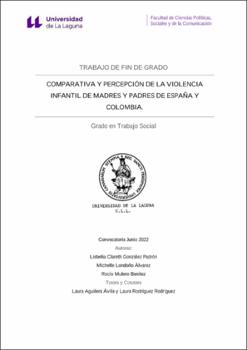Comparativa y percepción de la violencia infantil de madres y padres de España y Colombia.
Fecha
2022Resumen
La violencia infantil supone un reto en la sociedad, por ello, desde el Trabajo
Social se debe abordar esta problemática que afecta al ámbito familiar, y otros, para así
paliar las causas y abordar las consecuencias derivadas de la violencia hacia los/as
menores. De modo que, esta investigación tiene como objetivo comparar y conocer la
percepción de los padres y madres españoles/as y colombianos/as sobre la violencia
infantil.
Dentro de esta investigación se ha llevado a cabo un diseño preexperimental con
el objetivo de disminuir los sesgos y la deseabilidad social a través de un instrumento en
el que no se puedan alterar las variables, evitando así, la influencia de criterios
profesionales de las investigadoras. En la metodología implementada se ha utilizado un
instrumento de investigación cuantitativo adaptado a las jergas que se utilizan tanto en
España como en Colombia. Este instrumento ha sido el cuestionario, mediante el cual se
han recogido diferentes datos sociodemográficos pertenecientes a variables
independientes como el sexo, edad, estudios y tipología familiar entre otros, además de
todas aquellas variables relacionadas con las conductas de violencia infantil.
Conforme a los resultados obtenidos se puede observar que ha habido una
evolución en el ámbito familiar en relación con la percepción de conductas y acciones
que ponen en riesgo la integridad física y psicológica del/la menor, a pesar de ello, todavía
siguen existiendo conductas violentas que se normalizan como métodos efectivos de
crianza Violence against children is a challenge in society. Therefore, from Social Work
must be address this problem from the family level, in order to alleviate the causes and
address the consequences of violence against minors. Consequently, the objective of this
research is to compare and know the perception of Spanish and Colombian parents about
child violence.
Within this research, a pre-experimental design has been carried out with the aim
of reducing biases and social desirability, through an instrument that does not alter the
variables. Therefore, the influence of professional criteria of the researchers has been
avoided. In the implemented methodology, a quantitative research instrument has been
used. This instrument has been adapted to the jargons used in Spain and Colombia.
Through this questionnaire, different sociodemographic data have been collected, using
independent variables such as sex, age, studies and family typology among others. As
well, all those variables related to behaviors of child violence have been taken in account.
According to the results obtained, it can be observed that there has been an
evolution in the family environment in relation to the perception of behaviors and actions
that put the physical and psychological integrity on the minor at risk. Despite this, there
are still violent behaviors that are standardize as effective parenting methods.





